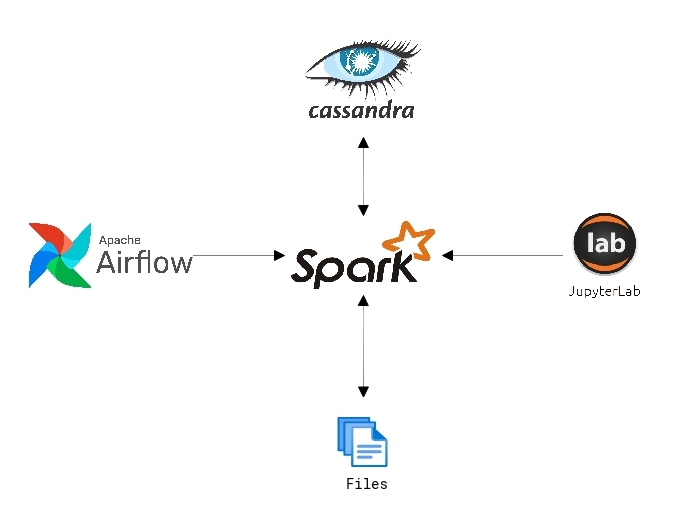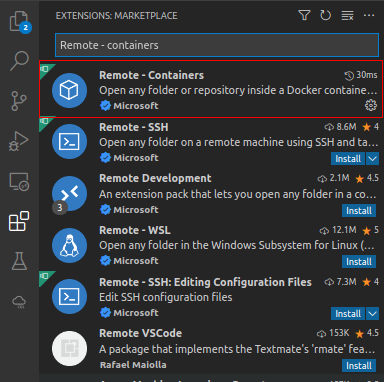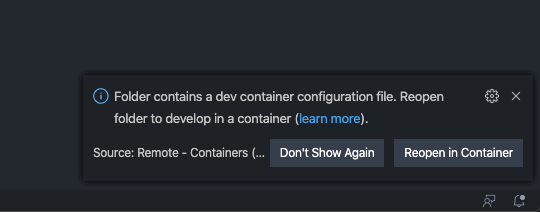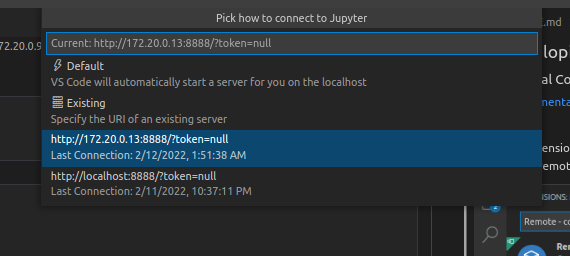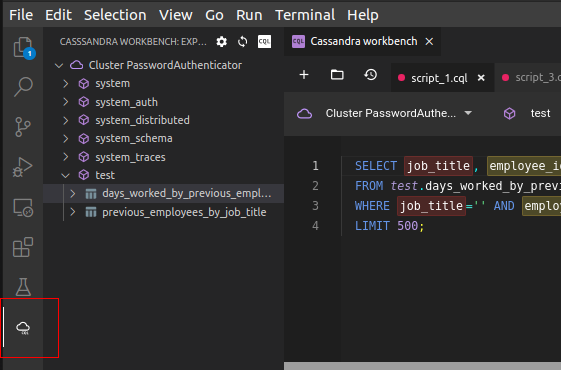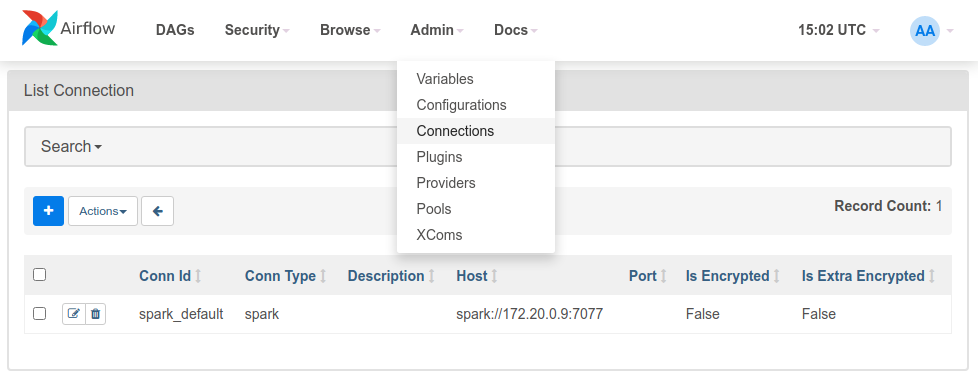This lab environment is composed by:
-
Apache Spark
-
Apache Cassandra
-
Apache Airflow
-
Jupiter Lab
The initial idea is to do a ingestion from a a datasource (flat files) to Cassandra using Airflow and Spark.
- Minio Integration with Apache Spark (Tested via notebooks)
- Minio Integration with Apache Airflow
- Minio Integration with Apache Cassandra
- Alyra correct integration - Save Dags in Apache Airflow
git clone {repository}Follow documentation for Docker installation and documentation for Docker-compose installation
Follow documentation
Install an extension so that you can develop using the containers created by docker compose. Access Extensions visualization (Ctrl+Shift+x) and search for extension "Remote - Containers" aka id "ms-vscode-remote.remote-containers"
if this is the first time you open the project folder, a message will probably appear to confirm the opening of the project in a container, as in the image below
Visual Code makes it possible to run notebooks remotely using an existing Jupyter service.
Once a notebook(.ipyn) file is opened inside Visual Code, if it doesn't automatically open the docker-compose service. In the lower right corner, there will be the option to select the Remote service
You will be prompted for the URI of the Jupyterlab service. Example: http://172.20.013:8888
And then you will be asked for the service password. The password is datalake
docker-compose up -d --remove-orphans --force-recreatehttp://172.20.0.13:8888?token=datalake
user: airflow
password: airflow
Main IP: 172.20.0.11
docker exec -it datalake_cassandra cqlsh -u cassandra -p cassandra via web interface
or using Cassandra Extension in Visual Code
|-- .cassandraWorkbench CassandraWorkbench extension folder
|-- .devcontainer Set of development container definitions
| |-- devcontainer.json Container configuration file
| |-- docker-compose.yml Extra settings for running docker-compose file
|-- .vscode Contain settings, task settings, and debug settings
| |-- settings.json Extension settings for linters and code formatting tools to enforce the language rules used in this repo
|-- config Contain settings, task settings, and debug settings
| |-- airflow Extension settings for linters and code formatting tools to enforce the language rules used in this repo
| | |-- configure.sh Extra airflow settings that could not be executed when creating the container. They contain the creation of standard connections and the installation of a kernel to run notebooks
|-- dockerfiles Custom docker files
| |-- Dockerfile_airflow Apache Airflow docker file. Required for Java to be installed on the service
| |-- Dockerfile_jupyterlab JupyterLab docker file. Required for personalized libraries and plugins
| |-- Dockerfile_spark Spark docker file. Required for personalized libraries and plugins. Required for changing Python version. This version needs to be the same as the Python version in the Apache Spark container
|-- docs Folder for other types of documentation
|-- storage Folder that will centralize and simulate an s3 storage using minio
| |-- bucket Just a separation to define the main volume of the buckets used by Minio
| | |-- airflow-dags Folder where the Apache Airflow Dags configuration files will be stored.
| | | |-- cassandra_create_test_database_dag.py Sample Dag file example that creates objects(keyspace table) in Cassandra
| | | |-- configuration_dag.py Sample Dag file example that creates the default connections and the installation of a kernel for running notebooks
| | | |-- spark-cassandra-dag.py Sample Dag file that runs an app(python) that will read from a text file and insert into cassandra tables
| | | |-- spark-cassandra-dag_withPapermill.py Sample Dag file that runs Notebook using Papermill extension, which in turn will read from a text file and insert into cassandra tables
| | | |-- spark-dag.py Sample Dag file example that runs an application (python) that only checks if the connection to spark is working
| | |-- data Shared folder between Apache Airflow, JupiterLab and Apache Spark that stores raw files
| | |-- logs Log storage of all services
| | |-- jupyter-notebooks Shared folder between Apache Airflow, JupiterLab and Apache Spark that stores Pyspark Notebooks
| | | |-- spark-book-count.ipynb Sample Notebook that only checks if the connection to spark is working
| | | |-- spark-extract-and-load.ipynb Sample Notebook that will read from a text file and insert into cassandra tables
| | | |-- spark-excel.ipynb Sample Notebook that will read from a Excel file
| | | |-- spark-minios3.ipynb Sample Notebook that will read a flat file in an s3/minio bucket
| | | |-- spark-minios3-excel.ipynb Sample Notebook that will read from a Excel file in an s3/minio bucket
| | | |-- spark-minios3-excel-deltakae.ipynb Sample Notebook that will read from a Excel file in an s3/minio bucket and using Delta Lake
| | |-- spark-apps Shared folder between Apache Airflow, JupiterLab and Apache Spark that stores Python applications
| | | |-- spark-book-count.py Sample Python application that only checks if the connection to spark is working
| | | |-- spark-cassandra-test.py Sample Python application that will read from a text file and insert into cassandra tables
|-- docker-compose.yaml Docker-compose file
|-- README.md Readme file
|-- .cassandraWorkbench.jsonc CassandraWorkbanch extension configuration. In this file is Cassandra's host address
In this project, there are some examples made in both Python and Notebooks. The creation of all dependencies for the tests will be done by Dags that are created in Airflow.
The creation of the database objects for testing is in the Airflow Dag: cassandra_create_test_database_dag.py. If it is necessary to create manually, use the various access methods in cassandra, as described in this documentation.
Scripts that will be run by airflow Dags:
create keyspace test with replication = {'class': 'SimpleStrategy', 'replication_factor': 1};
CREATE TABLE test.previous_employees_by_job_title ( job_title text, employee_id uuid, employee_name text, first_day timestamp, last_day timestamp, PRIMARY KEY (job_title, employee_id) ) WITH CLUSTERING ORDER BY (employee_id ASC);
CREATE TABLE test.days_worked_by_previous_employees_by_job_title ( job_title text, employee_id uuid, employee_name text, days_worked int, PRIMARY KEY (job_title, employee_id) ) WITH CLUSTERING ORDER BY (employee_id ASC);
For the application of this environment in production, in addition to using multiple hosts to accommodate all services, some extra configurations are needed to ensure integration between services.
For other details not documented here, check the settings that are in docker-compose.
There must be a single volume on the network that can be accessed by the Apache Spark, Jupyter Hub, and Apache Airflow services. This is necessary so that all services can see and maintain Apache Airflow Dags, Applications or Notebooks that will be run by Apache Spark and accessed by Apache Airflow. It is recommended to use a scalable, high-performance storage layer.
So that all services can communicate correctly, it is mandatory that Spark core versions and Java installation are the same.
In order for Apache Airflow to have a standard connection with Apache Spark, the following command must be executed inside the host where Apache Airflow is installed
airflow connections add "spark_default" --conn-host "spark://{ip host spark}:{port host spark}" --conn-type "spark"
However, this configuration can also be done using the Apache Spark web interface.
Installing a Python kernel so notebooks can be referenced by Apache Airflow within Dags.
pip install ipython ipykernel
ipython kernel install --user --name "python3"
Apache Airflow supports integration with Papermill. Papermill is a tool for parameterizing and executing Jupyter Notebooks. For more information check the documentation.
pip install apache-airflow-providers-papermill==2.2.0
